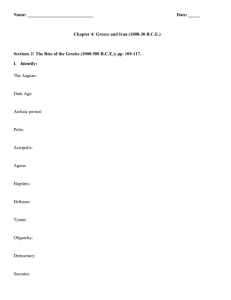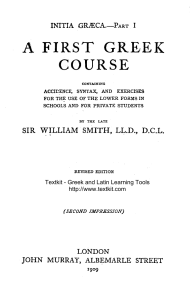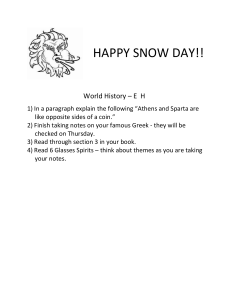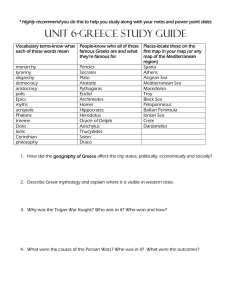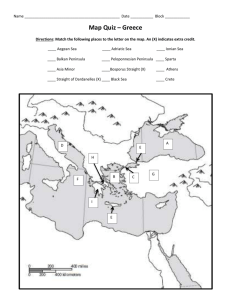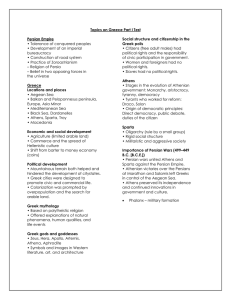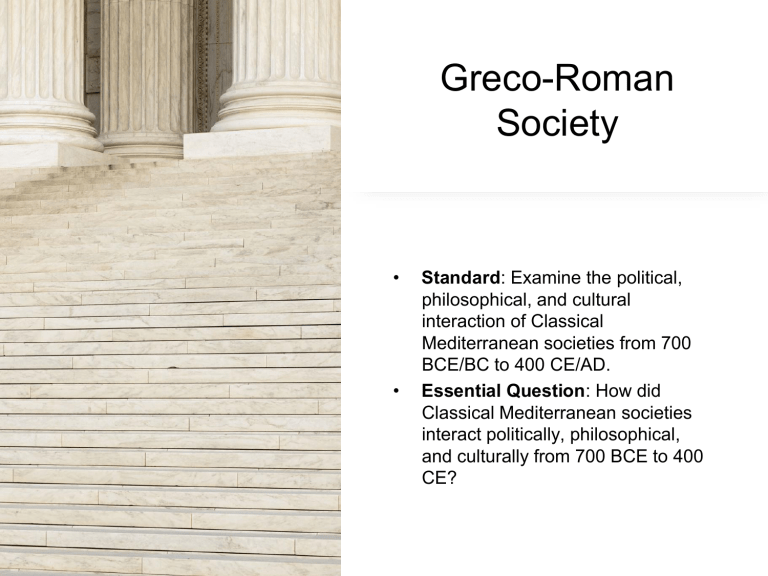
Greco-Roman Society • • Standard: Examine the political, philosophical, and cultural interaction of Classical Mediterranean societies from 700 BCE/BC to 400 CE/AD. Essential Question: How did Classical Mediterranean societies interact politically, philosophical, and culturally from 700 BCE to 400 CE? Greece Rome You are Here Ancient Greece • Vocabulary: Greek Polis Greece Geography • made up of two parts: • mainland • hundreds of small islands Geography • important geographic influences – mountains – seas • Geography • mountain ranges separated the small, independent Greek communities • caused them to develop different ways of life Geography • presence of a long seacoast with bays, inlets, and harbors • encouraged sea trade Geography Why Trade? • did not have good land for farming • rocky soil (compare to New England in America) Aegean Civilizations 3000 B.C. – 1000 B.C. • Mycenaeans • Minoans Phoenicians Phoenicians • Phoenicians occupied the coast of the modernday Lebanon/Syria/Israel (eastern Mediterranean) • First Seafaring culture of the Mediterranean – master shipbuilders • Established colonies • Phoenician cities first emerged as urban entities around 1500 B.C.E • https://www.timemaps.com/history/ world-1500bc/ • It was a time of economic prosperity for these trading centers due to linking colonies throughout the Mediterannean • Traded murex – purple dye (sea snails) which was very sought after $$$ • Became the color of royalty and wealth • Created the first phonetic alphabet Mycenaean Civilization • Fierce warriors that spread their culture through conquest around the Aegean Sea – Set up kingdoms in those areas – Also became wealthy from sea trade Mycenaean civilization “Bronze Age” flourished between 1600 and 1100 B.C. powerful monarchs lived in fortified palaces built on hills and surrounded by stone walls Mycenaean Civilization • military adventures recorded – hundreds of years later – Homer’s epic poems • the Iliad and Odyssey Trojan War • fought between the Mycenaeans and the people of Troy • myth or reality? • Achilles led the Mycenaean invasion against the Trojans led by Prince Hector • stalemate for 10 years Trojan War • ends with the Trojan Horse • Mycenaean's hide inside • Horse brought into Troy • Mycenaeans burn Troy down • Mycenaeans win Impact on Trojans • City left in ruins • Women became slaves to Greeks – development of slavery in the region. • Left to mourn loss of great heroes and family members Impact on Greeks • • • Lost faith in themselves Lost many men Loss feeling of safety Dorians Civilization • Myccenaeans collapsed around 1100 B.C. • conquered by the Dorian Civilization • entered into a Dark Age Dark Ages • • • • • population declined less food economy collapsed few records remain from this period lasted from 1100 to 750 B.C. Homer • a blind poet • began a story oral storytelling tradition • at the end of the “Dark Age” • Fact or fiction? Impact of Homer’s works • regarded as “history” • became a way to teach Greek culture to Greek children • Origins of Myth: traditional story that explains why the world is the way it is • established the epic – Heroic story told in the form of a long poem • gave the Greeks an ideal past peopled with heroes • Generations of Greek males used these poems as models of heroism and honor Greek Culture • Vocabulary: polytheism Greek Religion • Polytheistic – worship of many gods • Greek stories or myths developed about their gods Description • • • • Mythology was used to explain the environment in which humankind lived scholars believe that many elements of Greek mythology have strong factual and historical roots. Explained the natural phenomena witnessed myths were used to re-tell historical events so that people could maintain contact with their ancestors, the wars they fought, and the places they explored • Greek Mythology Mythology – the family of Greek gods and goddesses that ruled on Mount Olympus – Zeus - chief god – Hades - god of the underworld – Apollo - god of light (sun god) – Athena - goddess of wisdom – Aphrodite – goddess of love Greek Gods • Bottom Right: Athena • Top Left: Zeus • Top Right: Hades • Bottom left: Apollo Olympics • First held in 776 BC • Held to honor Zeus • Athletes came from all over the world to compete • Emphasis on human form/body • Individual events rather than team • Women were not allowed Sports from the first Olympics in 776 BCE Clockwise starting on the left: Wrestling, Horse back riding, Chariot racing, Boxing, Discus, Jumping, and Running Center: Javelin Development of the Polis • Vocabulary: Greek Polis City-State evolves • Polis: • Greek City-State • included a city and the surrounding land and villages • Usually located on a hill • Acropolis: • fortified area on top of a hill • Below acropolis was agora: an open area where people could meet Theocracy Etymology • Theos = god • Kratos = power Meaning • a religious body with political power (god is the ruler) Monarchy Etymology • Monos = alone • Arkhein = to rule Meaning • Rule of one Oligarchy Etymology • Oligos= few • Arkhein = to rule Meaning • Rule of a few Aristocracy Etymology • Aristos = best • Kratos = power Meaning • The term originally denoted the government of a state by its best citizens, later by the rich and well born, hence the sense ‘nobility’ Democracy Etymology Meaning • Demos = common people • Power to the People (rule of many) • Kratos = power Compare/Contrast Aristocracy • refers to a power structure where the power is held by the nobility • The authority and power to rule may pass from family. • has been contrasted favorably with monarchy. Oligarchy • refers to a power structure where the power is held by a small group of people • Inheritance is not a necessary condition • Oligarchy is associated with tyranny and oppression. Path to Democracy Solon: • Of the Greek polis, Athens and Sparta were the most powerful and influential. • Political reforms instituted by Solon in 594 BCE and Pericles from 461 to 429 BCE brought Athens its closest to a true democracy. • 10% to 15% of the population of Athens was ever allowed to participate in government. Women, the foreign born, and slaves (about 30% of the population) were always barred from participation Path to Democracy Cleisthenes: • Began a limited democracy in Greece • Created the Council of 500 – Group of 500 male citizens who made laws Cleisthenes PERICLES • Expanded democracy in Athens • Athens became a direct democracy – All male citizens became members of the government – Women and slaves were excluded The Polis: Distinct CityStates… • People felt strong ties/loyalty to their city-state • bitter rivalries between city-states • led to continuous fighting • lead to Greece’s down fall Sparta Description: • Military Society • the largest and most sophisticated army in known world Sparta Significance: • Army governed life – trained in military – started at age 7 – marry at 20 but live in barracks – retire at 60 – 53 years of service Sparta Role of women: • produce healthy children • did not perform many domestic tasks • were trained in athletic events to keep healthy • could own property Sparta • Insert picture Education: • Military • No real education outside of the barracks • https://www.youtub e.com/watch?v=PZ T-RJGkfQ4 Athens Description: • ruled by a king until 7th century BCE • Replaced by an oligarchy to remove tyranny • economic problems led to farmers sold into slavery for nonpayment of their debts to aristocrats Athens • Athens had the world’s first democracy • Democracy: type of government in which all citizens take part in the day to day running of the government Significance: Direct Democracy • Every male citizen had the right to attend the Assembly • There they participated in the decision making process and voted on all government issues • Athenians practiced ostracism* *a person could be banished from the city for 10 years with 6,000 votes from the government! Athenian Women • Take care of home • Raise the children • Seldom allowed in public • No formal education • Could not own property • How does this differ from Sparta? The Persian Wars: Overview Despite their cultural ties, the Greek city-states were often in conflict with one another. The threat of the powerful Persian empire united the Greek city-states. The Persian Wars: Overview United, the city-states defeated the Persians and ended the threat of Persian invasions. Hoplite armies were called “walls of bronze” compared to the less equipped Persians The largest hoplite army- Over 30 city-states banded together with 110,000 soldiers for the final battle Persian Wars: The Outcome! Results •Athens increases its status among the city-states. •Athens enters into a Golden Age •Athens formed the Delian League: an alliance of Greek city-states with them in charge •Sparta is upset! The Peloponnesian War: The Alliance System Fails! The Peloponnesian War: CAUSES 1. Many Greeks outside of Athens resented Athenian domination. 2. Sparta formed the Peloponnesian League to rival the Delian League. 3. Sparta and Athens rivaling for supremacy… A Mysterious Plague Hits Athens! • During the war a plague (disease) sweeps through Athens • Plague destroys 1/3 of Athenian population • Kills many Athenians including Pericles • This allows Sparta to win the war!!!!!!!!! The Peloponnesian War: Effects 1. All the Greek city- states divided and in chaos! 2. Defeated democracy in Greece 3. Greece would eventually would be taken over by Macedonia to the north Key Figures • Vocabulary: Socrates, Plato, Aristotle, Alexander the Great Greek Philosophers • “love of wisdom” • refers to an organized system of rational thought • early Greek philosophers concerned with the nature of the universe • three of the greatest philosophers of the Western world – Socrates – Plato – Aristotle Socrates • developed the Socratic Method – a question-andanswer format to lead pupils to understand things for themselves – based on the belief that knowledge is already present within each of us Socrates • “the unexamined life is not worth living” – the belief in the individual’s ability to reason – important contribution of Greek thought • killed for “corrupting the youth” Plato • one of Socrates’ students • considered to be the greatest Western philosopher • The Republic: explained Plato’s views on government • believed that people could not achieve a good life unless they lived in a just and rational state • ideal state has three groups—rulers, warriors, and commoners • led by a philosopherking • men and women would have the same education and equal access to all positions • established a school in Athens called the Academy • Plato’s most important pupil • studied at the academy for 20 years • wide-range of interests • ethics & logic • Politics • Poetry • astronomy, geology, biology, & physics • found three forms of government: monarchy, aristocracy, and constitutional government(preferred) • The Lyceum Macedonia • North of Greece • viewed by the Greeks as barbarians • Philip II became king of Macedonia in 359 B.C. Unification of Greece • Macedonia defeated Greece at the Battle of Chaeronea in 338 B.C. • Greek city-states united in a league under Macedonian control • Philip was assassinated Alexander the Great • Philip’s son • student of Aristotle • became king of Macedonia at age 20 • put down idea of Greek rebellion by destroying the city of Thebes • began his quest to take over the Persian Empire Alexander’s Conquest • 334 B.C. began invasion of the Persian Empire • 331 B.C. conquered all of the Persian Empire • 327 B.C. moved through modern Pakistan into India • 323 B.C. Alexander died after his return to Babylon at 32 years old Alexander’s Legacy • • • Created an empire that stretched across three continents and over 200,000 miles Cultural Diffusion = the rise of the Hellenistic Culture After Alexander’s death, his Empire fell apart Hellenism • Vocabulary: Hellenistic culture Hellenistic Culture Description: • created by Alexander • blend of Greek and Persian cultures • Greek language, architecture, literature, and art spread throughout Southwest Asia, Central Asia and parts of North Africa • Greeks absorbed aspects of Eastern culture Hellenistic Culture Impact: • Four Hellenistic kingdoms emerged: Macedonia, Syria, Pergamum, and Egypt • all eventually conquered by the Romans • Alexandria, home to scholars of many different kinds Hellenistic Culture • Founding and rebuilding cities created opportunities for Greek architects and sculptors in the Hellenistic kingdoms • thousands of statues were erected sculptors moved away from classical ideals and created more emotional and realistic art The Library of Alexandria in Egypt The ancient library possibly destroyed in A. D. 642 The rebuilt library today Hellenistic Achievements • • • • • Astronomy Geometry Technology Philosophy Art Astronomy • Astronomers used an observatory to view the stars and planets. • Developed a new concept that believed the sun was larger than the earth Geometry • Euclid was a Greek mathematician and pioneer in geometry. • Euclid’s Elements became the most important – still basis of geometry Technology • Archimedes was a Greek scientist, inventor, and mathematician • created the pulley • created the Archimedes screw that brought water from a lower level to a higher one Philosophy • Stoics: philosophers who said people should live a moral life to keep them in harmony with natural laws • Epicureans: philosophers who said people could rely only on what they learned through their five senses Art • Change sculptures from the Greek style of perfect forms to a more realistic and emotional Hellenistic influence • Ex. Colossus of Rhodes
